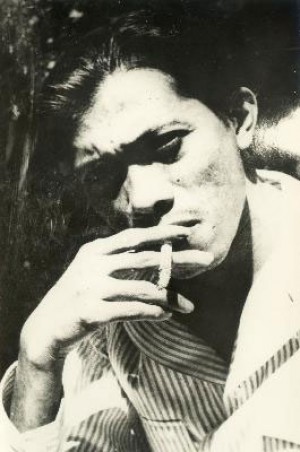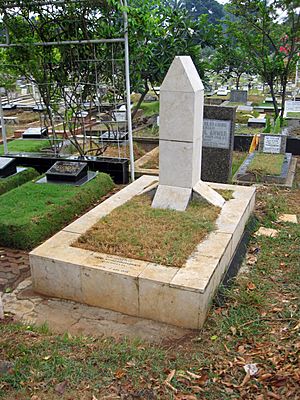Chairil Anwar facts for kids
Quick facts for kids
Chairil Anwar
|
|
|---|---|
 |
|
| Born | 26 July 1922 Medan, Dutch East Indies |
| Died | 28 April 1949 (aged 26) Djakarta, Indonesia |
| Occupation | Poet |
| Language | Indonesian |
| Nationality | Indonesian |
| Period | 1942–1949 |
| Literary movement | 1945 Generation |
| Notable works | Aku (1943) |
Chairil Anwar (born July 26, 1922 – died April 28, 1949) was an important Indonesian poet. He was part of a group of writers known as the "1945 Generation". He wrote about 96 works, including 70 poems.
Anwar grew up in Medan, North Sumatra. In 1940, he moved to Batavia with his mother. There, he started to meet other writers. He published his first poem in 1942.
Anwar kept writing, but the Japanese, who ruled Indonesia at the time, sometimes censored his poems. He lived a rebellious life and often wrote about death. He passed away in Jakarta from an unknown illness.
His poems explored themes like death, being an individual, and the meaning of life (existentialism). His works often had many meanings. Anwar was inspired by poets from other countries. He used everyday language and new ways of writing sentences in his poetry. This helped the Indonesian language grow and develop. His poems were often written in unusual ways, but each had its own special pattern.
Contents
Early Life and Writing
Chairil Anwar was born in Medan, North Sumatra, on July 26, 1922. As a child, he was very determined and didn't like to lose. His parents also had strong personalities. He was also quite spoiled by them.
He went to local schools for Indonesian children. He left school when he was 18 or even younger. Anwar later said he knew he wanted to be an artist from age 15. He had already started writing poetry in the popular style of that time.
After his parents divorced, his father still helped him and his mother financially. His mother moved to Batavia (which became Jakarta after Indonesia became independent). Anwar planned to continue school there, but he dropped out again.
In Batavia, he spent time with wealthy children and joined the local writing scene. Even though he didn't finish school, he could speak English, Dutch, and German well.
Becoming a Poet
Anwar wrote his poem "Nisan" ("Grave") in 1942. It was inspired by his grandmother's death and helped him become known. However, some of his poems were still rejected. For example, in 1943, he tried to submit poems to a magazine called Pandji Pustaka. Most were turned down because they were too focused on the individual. This didn't fit with the ideas of the Greater East Asia Co-Prosperity Sphere at the time.
But some poems, like "Diponegoro," were approved by the censors. During this period, he continued to meet other writers. They shared ideas, and he became a leader among them. He later started his own magazine called Gema Gelanggang. His last poem, "Cemara Menderai Sampai Jauh" ("Fir Trees Are Sown Off Into the Distance"), was written in 1949.
Anwar died in a Jakarta hospital on April 28, 1949. The next day, he was buried at Karet Bivak Cemetery. Some scholars believe Anwar knew he would die young. One of his poems, "Jang Terampas dan Jang Putus" ("The Seized and the Broken"), talks about giving up and even mentions being buried in Karet.
During his life, Anwar wrote about 94 works, including 71 poems. Most of these were not published until after he died. They were later collected into several books. Anwar himself thought only 13 of his poems were truly good.
His first published collection was Deru Tjampur Debu (Roar Mixed with Dust). This was followed by Kerikil Tadjam dan Jang Terampas dan Terputus (Sharp Pebbles and the Seized and The Broken). Some poems in these collections had the same title but were slightly different. His most famous work is "Aku" ("Me").
What His Poems Are About
It's hard to find one main idea that connects all of Anwar's poems. His poems often showed how he was feeling when he wrote them. But one thing common in all his work is a strong feeling of life and energy. This shows his bold and radical personality.
His poems often show excitement, but also fear of death or sadness. Because of this, it's hard to say what "the true Chairil Anwar" was like.
Anwar's works can be understood in many ways. Each reader can find their own meaning in his poems. For example, during the Japanese rule, they saw "Diponegoro" as a challenge to European rulers. Christians in Indonesia saw "Doa" ("Prayer") and "Isa" ("Jesus") as proof that Anwar liked Christianity. Muslims in Indonesia read "Dimesjid" ("At the Mosque") as proof that Anwar "met with Allah in a mosque."
Anwar was an "intellectual poet." His works were often thoughtful and somewhat detached.
How He Wrote
Anwar used everyday language in his poetry. He used it in new and unusual ways. He also played with how Indonesian words are formed, adding parts to the beginning or end of words. This made the language more lively and impactful.
His way of using language moved away from the old Malay style. He used words borrowed from Dutch and English. This influenced how the Indonesian language developed later on.
Anwar's Western influences show he was part of the 1945 Generation of writers. Earlier writers were mostly influenced by traditional poetry and nationalism. But the 1945 Generation, including Anwar, focused on ideas like being an individual and the meaning of life, which came from Western thought.
Anwar could use ideas, images, and feelings from other cultures in his poems. Most of these came from the West, but one poem clearly showed Japanese influence. His writing style was generally not traditional. Many of his poems mix short, single lines with long, connected lines. However, each poem still had its own clear structure. Only three of his poems followed the traditional four-line pattern.
His Lasting Impact
By 1980, more had been written about Chairil Anwar than any other Indonesian writer. Many of these writings were essays by young writers. They wanted to understand themselves through Anwar's works. Some even called Anwar "the perfect poet."
The anniversary of his death is celebrated as National Literature Day in Indonesia. This shows how important he is.
Anwar's poems have been translated into English, French, and Dutch.
Notable works
Gallery
See also
 In Spanish: Chairil Anwar para niños
In Spanish: Chairil Anwar para niños
 | Charles R. Drew |
 | Benjamin Banneker |
 | Jane C. Wright |
 | Roger Arliner Young |






